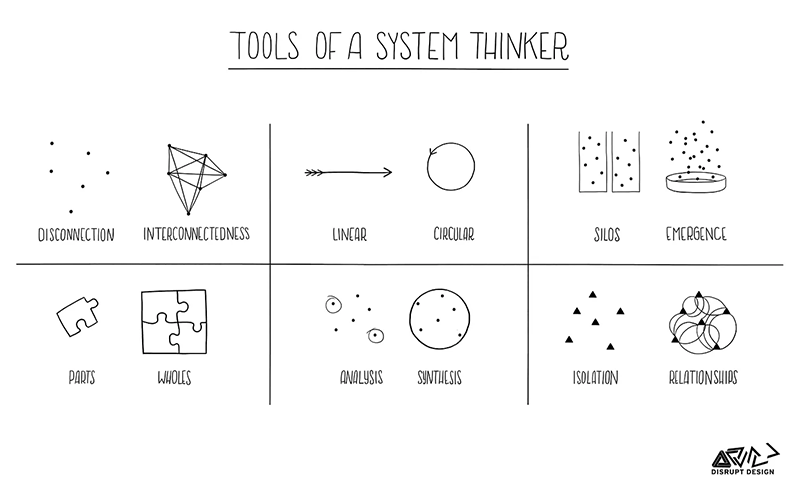Impulses for organisations – Part 11
In the online world, there are always valuable impulses from people who address cooperation in organisations, the use of tools or the impact on markets. In part 11 of this series, I would also like to ‘showcase’ some of these impulses here on the t2informatik Blog. This time it’s about corporate communication in digital times, thinking in systems and the utilisation and adaptation of processes.
Let’s get started with the impulses!
Corporate communication analogue versus digital
A criticism? A criticism from a journalist? In a newspaper? A criticism of us? Let’s take note, but quickly forget about it. Wipe our mouths, move on – tomorrow is another day!
Sounds resilient, doesn’t it? And I think it’s fundamentally wrong.
In traditional analogue corporate communications, that might have made sense:
🧐 Don’t respond to every criticism – you’ll only confirm it.
🤫 Don’t comment on every opposing opinion – you’ll only make it bigger than it is.
🤐 Don’t jump over every stick that is held out to you.
You examine each individual case and come to a conclusion on a case-by-case basis. And in 9 out of 10 cases, you don’t react.
This case-by-case assessment no longer works in the digital world. Because: What was previously ‘sent’, what was previously ‘sent’ and what previously had hardly any ‘reach’ is now accumulating. It adds up. Stays there, remains findable, doesn’t get lost. Instead, at some point it piles up into a huge sandcastle.
On the Internet, every criticism must be countered in an offensive and friendly manner. Why? Because otherwise it looks like a confirmed, uncontradicted fact. 10 criticisms and the company only comments on them once? Then the other 9 criticisms are probably true. 100 reviews, and the company has only published its own statement five times? Then the 95 unchallenged criticisms are probably correct. 1000 criticisms, but we only count 32 counter-opinions from the company? Then the almost 1000 criticisms are probably true! And if almost all 1000 are true, how convincing are the barely noticeable thirty counter-opinions?
Sentiment is determined by all available information. In other words, companies must take all criticisms seriously in their online reputation. And answer every single (serious!) posting. Must be ‘visible’ in every single criticism.
🤗 Otherwise they will only confirm the criticism.
😎 Otherwise you’ll make it bigger than it is.
😀 Yes, every jump over a held-up stick is a jump for the fans…
Your online reputation depends on your perception of the crisis. And your reaction to it. Deliberate ignorance then turns into arrogance. And then you deserve to be criticised unchallenged…
6 tools from systemic thinkers
I wish I had seen this graphic when I was 18 – then I might have found my profession #organisationaldevelopment sooner. Or at least understood why I think a lot more than others 😉
My brain thinks in a networked and #systemic way. I see connections instead of individual occurrences, I find linear processes boring and in many contexts simply unrealistic (waterfall Gantt charts, anyone?).
We have a mechanistic view of the world AND of organisations, which may have helped in the past, but today it is no longer enough to explain and move things forward. Climate crisis, global economy, corporate cultures – none of it can be cut into nice neat separate pieces.
I keep saying I’m a big fan of UK/US resources on #systemsthinking because it’s more generalised there than it is here. Take this from Leyla Acaroglu as further proof 🙂
(The title ‘tools’ is debatable though, for me more like ways of thinking).
Scrutinise your processes
When following the process becomes the goal, be prepared for mediocre outcomes.
There is no process that is so useful that it should be considered superior to everything else.
With any process, even the best you can think of, there is always the question, “which purpose does this process serve?” – and from there we go to the question, “What is the best way to achieve this purpose?”
If your best answer is “the purpose is that everyone follows the process, and the best way is to have everyone follow to the process” – trash the process immediately!
Enterprises have a huge tendency of accumulating process cruft – tedious, heavy processes binding many resources only for the purpose of establishing, serving, reporting and monitoring the process – whereas companies that do not even have that process at all are thriving and innovating.
So how can it be “they” are doing just fine without that process, and “we” have come to believe that the only way to stay in business is slavishly following that process?
Question your processes.
Always ask, “Why does it exist?”
And from there, look for the simplest, easiest way to achieve the actual outcome.
Impulses and questions
Three topics, three experts, three impulses. How is traditional corporate communication changing in digital times and how should companies deal with public criticism? What are fundamental concepts in system thinking and why is it no longer enough to think only in linear contexts? And how can organisations recognise that their processes need to be adapted to new circumstances?
Questions upon questions. Maybe you have some too; that’s good! Then Part 11 of ‘Impulses for organisations’ has also achieved its goal.
Notes:
If you like this article or would like to discuss it, please feel free to share it with your network.
Harald Ille has published two articles on The 6 ½ phases of a communication concept and Contradictory KPI in online marketing on the t2informatik Blog.
[2] Maike Kueper works, thinks and speaks about new ways of working in sustainable organisations. Instead of (fr)agile master plans, she focuses on evolutionary organisational development. Information about Maike Küper can be found on her website and in her LinkedIn profile. The impulse can be found here in the original on LinkedIn.
Michael Schenkel has published other impulses on the t2informatik Blog, including

Michael Schenkel
Head of Marketing, t2informatik GmbH
Michael Schenkel has a heart for marketing - so it is fitting that he is responsible for marketing at t2informatik. He likes to blog, likes a change of perspective and tries to offer useful information - e.g. here in the blog - at a time when there is a lot of talk about people's decreasing attention span. If you feel like it, arrange to meet him for a coffee and a piece of cake; he will certainly look forward to it!



